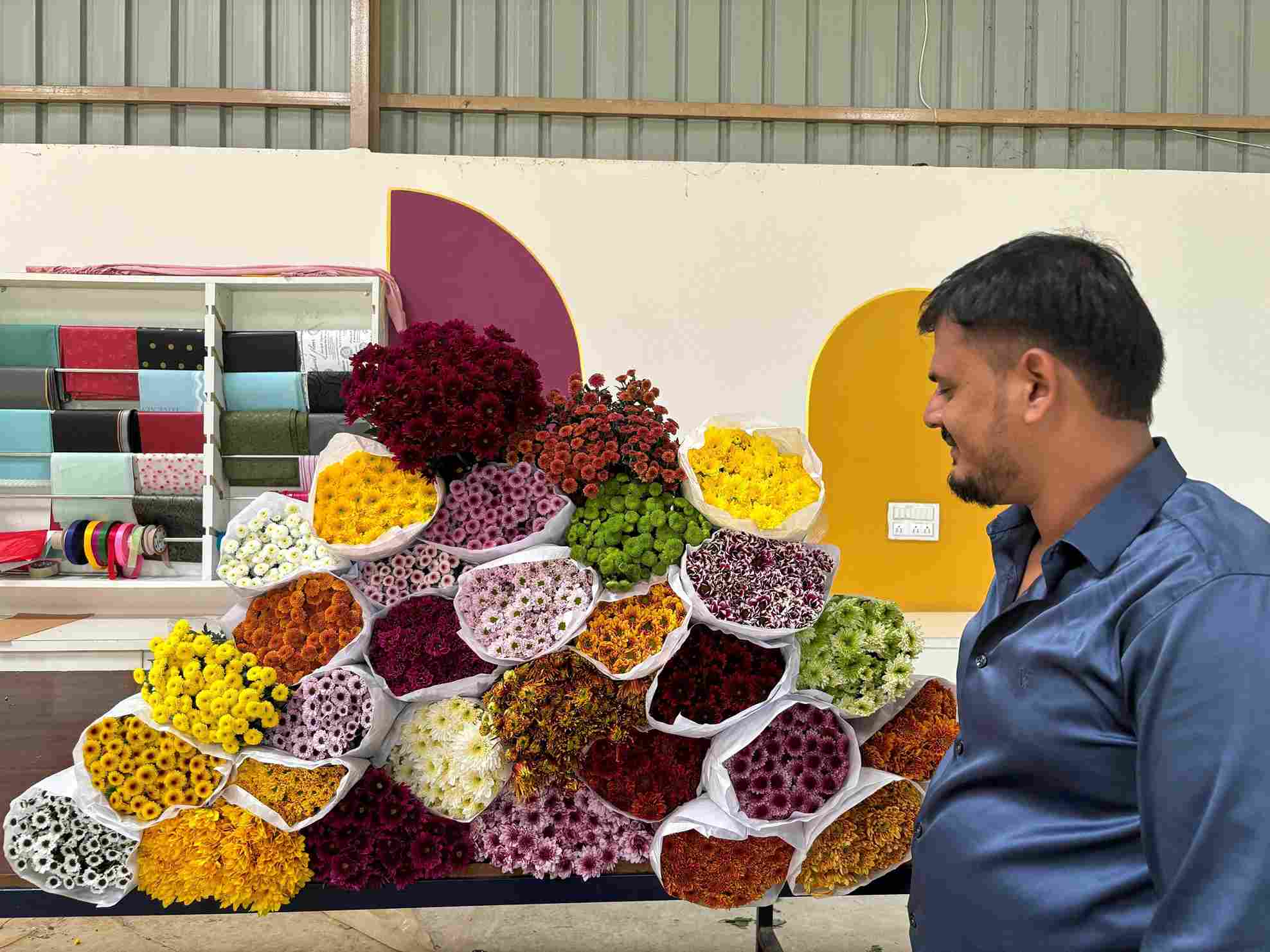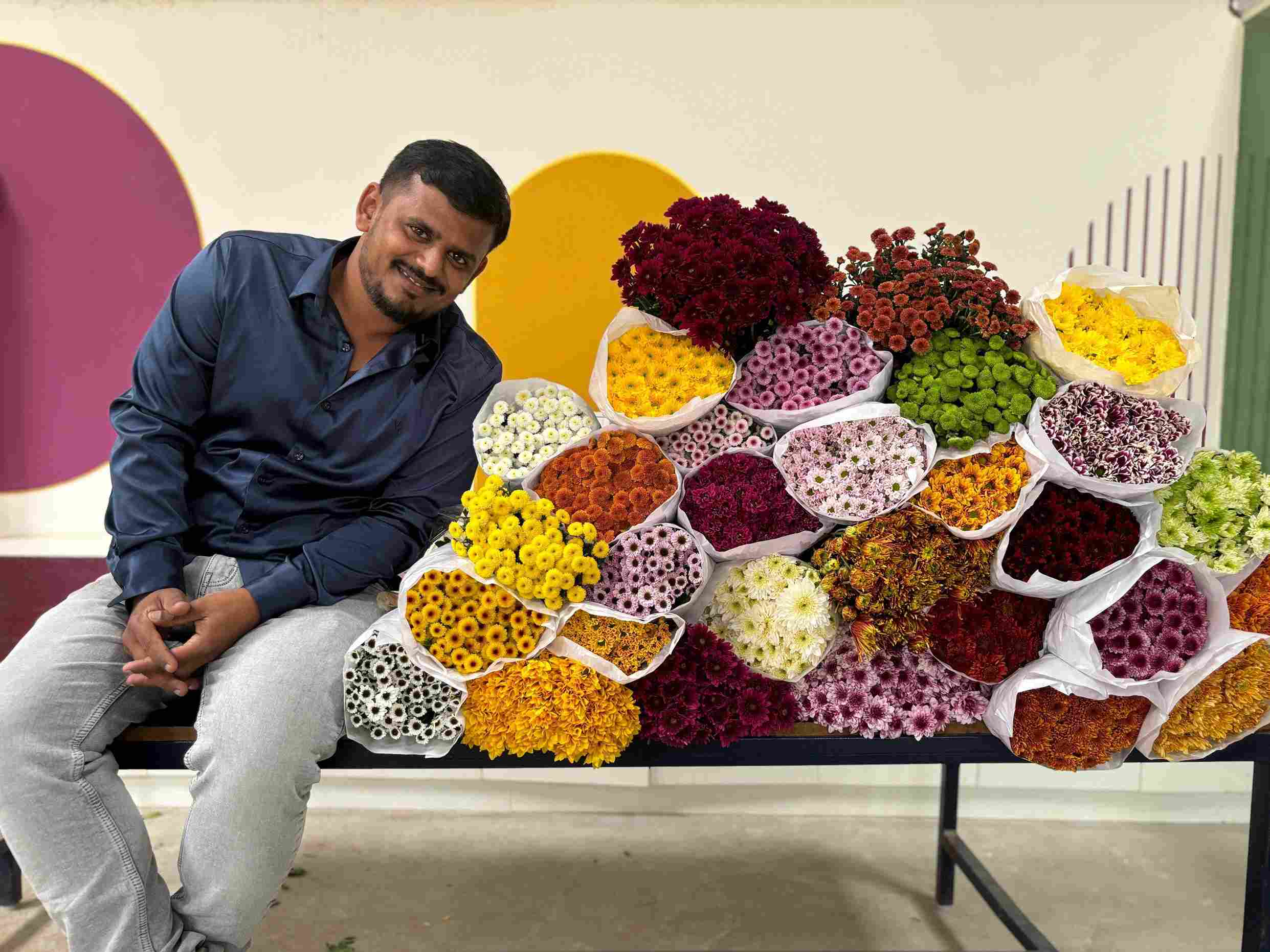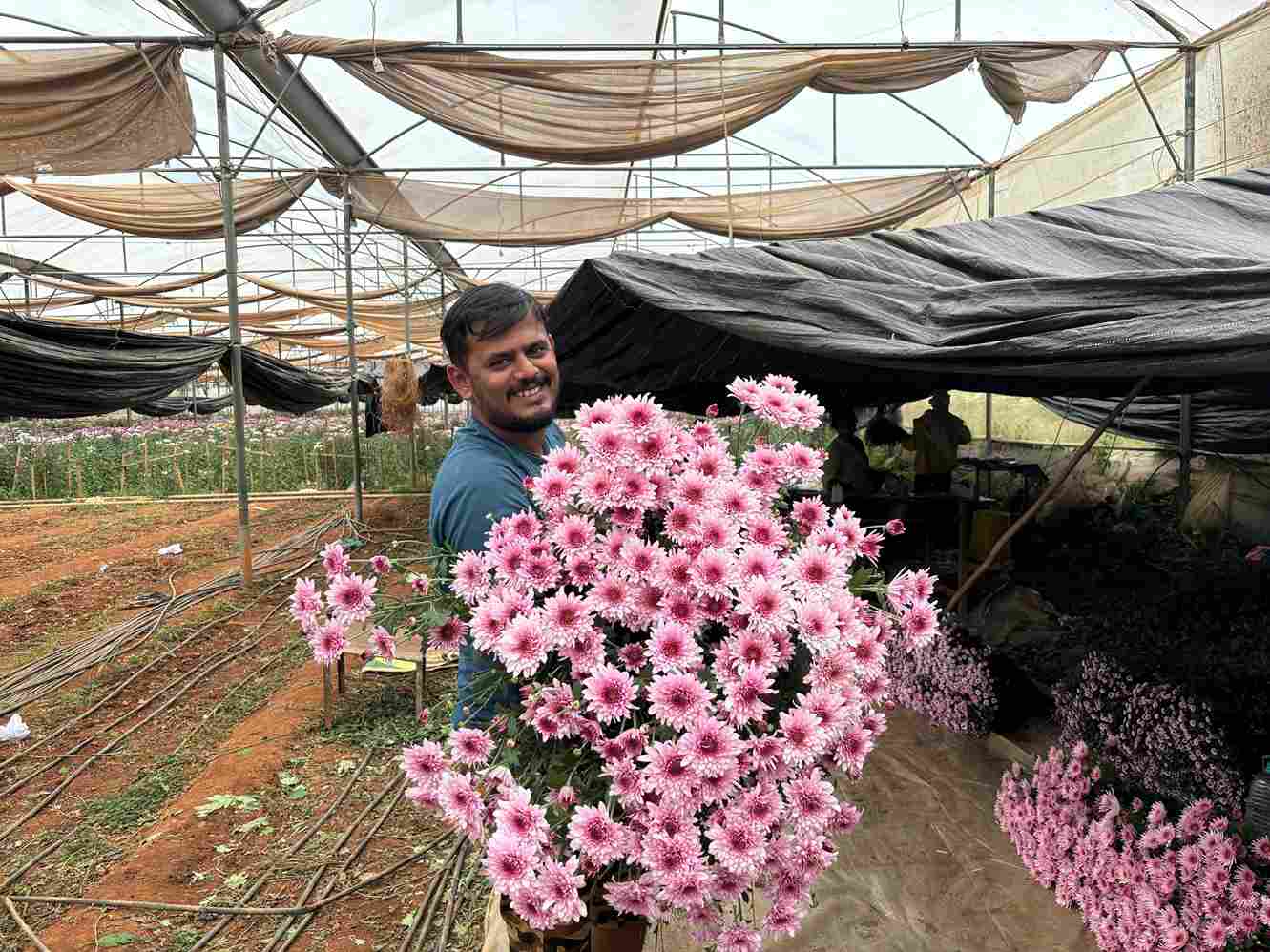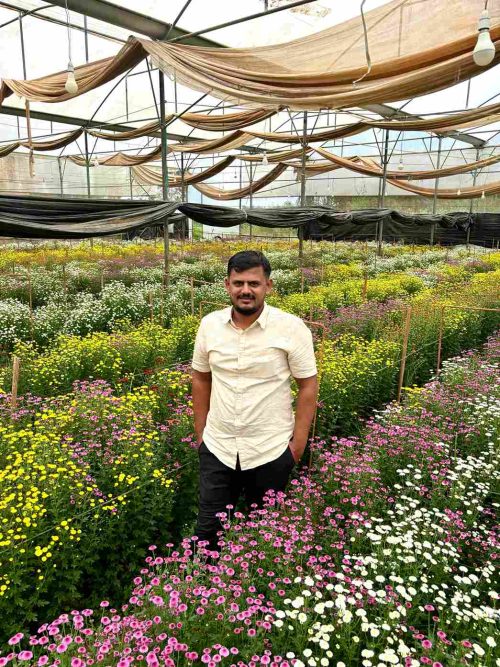Lohith Reddy, a 31-year-old from Kommasandra in Bengaluru, Karnataka, traded a promising tech career to grow flowers — a decision that has blossomed into a Rs 7 lakh/month venture.
Coming from a family of traditional farmers, he was no stranger to the hard work and discipline required in agriculture. His family owned four acres of land in Kommasandra, where they grew crops like ragi and lentils.
After completing his engineering degree in electronics from Vemana Institute of Technology, VTU, he was expected to take up a secured job in the tech industry like many of his peers. But the young graduate had other plans.
Lohith’s interest in flowers began during his school years. His cousin, Gopal S Reddy, who had been growing and selling flowers since 1995, played a crucial role in sparking his curiosity. When his cousin shifted to protected cultivation farming, he was actively involved in the day-to-day activities.
“I used to look after the flowers, see how they grew, and that’s when my interest in commercial flower farming began,” Lohith tells The Better India. This on-ground experience with floriculture spurred a passion that later defined his professional journey.
Trading tech for floriculture
In 2013, Gopal began cultivating roses on his land, but eventually moved to the UK, leaving the farm behind. This opened up an opportunity for Lohith, who had always been passionate about flower cultivation, to take over and manage the farm.
“After completing my engineering, I realised I wanted to gain hands-on experience in flower farming,” he shares. This decision marked the beginning of the entrepreneur’s journey into the world of flowers. While continuing his brother’s rose cultivation, he began exploring floriculture extensively.

In 2018, Lohith took his first major step into commercial farming. “I built my farm with an investment of Rs 15 lakh, which included building a polyhouse for Rs 8 lakh, and purchasing 12,000 gerbera plants from a nursery in Pune for Rs 4 lakh. I sold about 40,000 to 50,000 gerbera flowers per month in the Bengaluru market, making around Rs 1.5 lakh monthly,” he informs.
“I started with gerbera because it was a crop that, if properly maintained, could yield for more than three years. I wanted a reliable source of income in the beginning,” he explains. The success of this initial venture gave him the confidence to diversify his flower farming operations.
While gerberas proved to be successful, Lohith was always on the lookout for other opportunities to expand his flower business. “When I started, I realised chrysanthemum was not being grown much. Very few farmers were growing it, and the demand wasn’t that high. But I saw the potential,” he recalls.
He decided to take a leap and started growing chrysanthemums, alongside gerberas. “I dedicated around 4,000 square meters of my farm to chrysanthemums and planted 2,000 square meters of gerberas,” he says. His instinct to diversify paid off. Chrysanthemums turned out to have immense market potential, not just in terms of popularity but also because of their versatility in colour and size.
Experimentation and a quest for quality
However, growing the flowers presented their own set of challenges. One of the major obstructions Lohith faced was the flower’s light sensitivity. “Chrysanthemum is a light-sensitive crop. It requires 17-18 hours of darkness, which is only possible during winter. Managing this in Bengaluru’s longer summer days was a challenge,” he explains. He also found that chrysanthemums grown in India and abroad performed differently in terms of quality, and he had to experiment with various varieties like pink Santini, yellow Santini, and red calimero to find the best fit for the local climate.

He continued experimenting and refining his farming methods. Bengaluru’s climate, with its moderate temperatures ranging between 22 to 30 degrees Celsius, proved to be ideal for growing high-quality chrysanthemums. He leveraged this natural advantage, and through trial and error, he developed a proper understanding of the flower’s needs. “You can manage chrysanthemum farming by using artificial methods, such as installing nets to control light exposure or sprinkling water to maintain optimal humidity,” he explains.
In the early stages of farming, he faced a steep learning curve. “We didn’t have much technical knowledge at first. It was all about figuring things out on our own. But over time, I realised we needed help from breeders to improve our varieties,” he shares.
Today, Lohith’s chrysanthemum farm, ‘Lohith Flora’, has become a successful business. “After 2023, I converted 2.5 acres of my land to exclusively grow chrysanthemums,” he informs.
Expanding beyond Bengaluru
Through dedication and hard work, Lohith has built a solid foundation for his farm. He also realised that quality mattered immensely. Early on, he noticed that other farmers were not growing high-quality chrysanthemums, which affected their shelf life. “When people are paying Rs 500-600 for a bunch of flowers, they expect them to stay fresh for more than a week. We made sure that our flowers stayed fresh and durable, which helped us build a loyal customer base,” he says.
As Lohith Flora grew, he began to explore different markets for his chrysanthemums. Initially, he sold his flowers locally, but he quickly realised that the wholesale market offered more opportunities. “I started selling to wholesalers and event managers, reaching out to various buyers to understand what the market needed. In the beginning, I had to sell at a lower cost to build trust,” he reflects.

Through continued market research, Lohith found his niche. He discovered that chrysanthemums were particularly popular among event organisers, florists, and wholesalers. As demand grew, he expanded his customer base beyond Bengaluru, reaching out to cities like Delhi, Mumbai, Kolkata, Hyderabad, and Guwahati. His focus on quality and freshness set him apart in the competitive flower market.
A key factor in the entrepreneur’s success has been the development of a supply chain that can deliver fresh flowers across India. “We take online orders to supply chrysanthemums in different cities,” he explains.
To ensure the freshness of his flowers, Lohith invested in a cold chain system. After harvesting, the flowers are stored in cold storage for hydration, which increases their shelf life. “We’ve built a system where we can deliver fresh flowers, and this has helped us grow our customer base significantly,” he explains.
Ashok Agarwal, a flower wholesaler from Jaipur, Rajasthan, has been sourcing chrysanthemums from Lohith for the past five years. He says, “His flowers are always fresh and typically last up to seven days. Due to their excellent quality, they sometimes remain fresh even longer. I can blindly trust him when it comes to buying chrysanthemum flowers because I have never faced any problem or complaints in the past couple of years.”
Contributing to the local economy
Lohith Flora has now grown into a flourishing business. The farm produces 1,500 bunches of chrysanthemums every week, generating a steady income of Rs 7 lakh per month. The monthly expenses, including labour, irrigation, and farm maintenance, are around Rs 3-3.5 lakh.
“We plant flowers every ten days, ensuring that the production is continuous. The key to success in this business is consistency and understanding the market needs,” he explains.
With over 20 people employed on the farm, he has created jobs and contributed to the local economy.

Lohith has big plans for the future. He is looking to expand his reach even further, particularly by strengthening the supply chain and increasing his direct customer interactions. “We are working on expanding our presence to serve more customers directly. We aim to make our farm a household name for quality chrysanthemums,” he says. He also plans to explore new varieties of chrysanthemums and work with breeders to improve his offerings.
“Currently, we serve customers through wholesalers, event managers, and florists, but in the near future, we aim to take direct orders from end customers and deliver our flowers straight to their homes, reaching the vases where they truly belong,” he explains.
The 31-year-old’s transformation from an engineering graduate to a successful chrysanthemum business owner is a captivating journey of following one’s passion and charting an unconventional path to success.
“I love spending time amid flowers and greenery and could never stand being confined to a building. It’s soul-satisfying to be surrounded by flowers,” he smiles.
Edited by Arunava Banerjee; All pictures courtesy Lohith Reddy
No comments:
Post a Comment